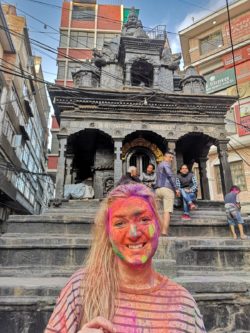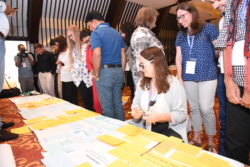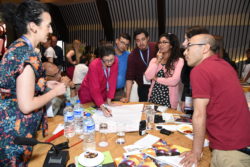Webinars: A vital resource during lockdown
As we’re sure many of you have, the CE4AMR team have been attending as many online workshops and webinars as possible during lockdown. This week was no exception with the team tuning in to the Cochrane public engagement webinar on Wednesday. Hearing from both Global North and South projects within this webinar was particularly interesting given the LMIC focus of CE4AMR’s work. Plus, as with all webinars recently, we were also interested in how public and community engagement interventions are being adapted around the COVID-19 pandemic. For our PhD candidate this webinar was particularly helpful in terms of reflecting upon the changes to her research, field work and thesis plans. Now developing a more theoretical project, Nichola discusses some of the key themes of the Cochrane webinar in relation to her work, and we think about the broader benefits of moving research conversations online.
 I have found that webinars, such as Cochrane’s public engagement offering, are helping me to understand the opportunities and challenges within community engagement research in a more practical way. My plans had been to conduct fieldwork using participatory video methods to address AMR in a small community in Nepal, however recent travel restrictions have made that impossible. My thesis now will be more theoretical, meaning that these seminars are a great way for me to keep in touch with recent public engagement fieldwork. Listening to the practical barriers faced in some areas such as lack of internet access, as well as their successes in completing meaningfully engaged research to be a great way to understand the experience of conducting fieldwork.
I have found that webinars, such as Cochrane’s public engagement offering, are helping me to understand the opportunities and challenges within community engagement research in a more practical way. My plans had been to conduct fieldwork using participatory video methods to address AMR in a small community in Nepal, however recent travel restrictions have made that impossible. My thesis now will be more theoretical, meaning that these seminars are a great way for me to keep in touch with recent public engagement fieldwork. Listening to the practical barriers faced in some areas such as lack of internet access, as well as their successes in completing meaningfully engaged research to be a great way to understand the experience of conducting fieldwork.
While listening to the speakers it struck me that we all seem to be grappling with similar questions, even though research topics and geographic locations greatly differed. In my own work, though now mainly theory based, I have been trying to define what I mean by terms such as community, engagement, involvement etc. The speakers often addressed that in different academic faculties and different countries we can use some words interchangeably; for example, the terms engagement and involvement can sometimes mean the same thing in some research settings but differ in others. Speakers identified a need, therefore, to set intentions as clearly as possible at the outset and during projects.
Another common thread in the webinar presentations that I have found to be a challenge in my own work is power; the balance and dynamic in community engagement projects and how to share it. How do we identify these power structures (both formal and informal) and make them work to the benefit of the research? Another element of power, in terms of direction of research and shaping outcomes was highlighted several times. The outcomes of a project and who they benefit must be clear and equitable – We can always assume that relevant research and academic communities will value the outputs of a project, but how does the subject community benefit?
I found these conversations to be encouraging. It can be  difficult at times, as a junior member of the research community (PhD student) to feel as though its OK to not have concrete answers to bigger issues such as power dynamics, assessing impact of projects etc. To see well-established researchers address these issues as just that, issues to be discussed in a non-tokenistic manner, was really heartening. It was reassuring to see a community of researchers openly discuss both their successes in community engagement as well as the challenges they face. Open discussions about what is still needed from research institutions, academics, and other organisations and what we need to move towards more inclusive research practise.
difficult at times, as a junior member of the research community (PhD student) to feel as though its OK to not have concrete answers to bigger issues such as power dynamics, assessing impact of projects etc. To see well-established researchers address these issues as just that, issues to be discussed in a non-tokenistic manner, was really heartening. It was reassuring to see a community of researchers openly discuss both their successes in community engagement as well as the challenges they face. Open discussions about what is still needed from research institutions, academics, and other organisations and what we need to move towards more inclusive research practise.
It's great to hear how Nichola has been able to use webinars so positively when making the very difficult decisions to change her research project. The loss of field seasons is always challenging but with the her new theoretical focus Nichola has an equally important PhD project to develop. Both photographs are of Nichola's very quick trip to Nepal this March which was obviously cut short due to COVID-19.
The wider CE4AMR network has really benefited from the explosion of webinars sharing findings and developing critical conversations in the fields of both AMR and Community Engagement. As Nichola mentions, the definitions of engagement, involvement and participation can differ across research groups so it's great to hear these explained from different perspectives. The AMR landscape is equally fraught with labelling and language challenges which we at CE4AMR hope to provide guidance on in the future. For now, we are really pleased that webinars are continuing the conversations Nichola describes, and many others. Those who cannot actively engage in research have been able to continue sharing their work across practical and geographical boundaries.  Indeed, CE4AMR's own team and associated projects have all made use of online communications during lockdown and reflected that some negative assumptions around online communication aren't actually such a concern in practice. For example bringing together consortiums across multiple time zones can be possible if your event is planned well in advance. The use of creative functions such as online white boards can facilitate discussion and problem solving, whilst break-out rooms allow networking and important social interactions between attendees to continue.
Indeed, CE4AMR's own team and associated projects have all made use of online communications during lockdown and reflected that some negative assumptions around online communication aren't actually such a concern in practice. For example bringing together consortiums across multiple time zones can be possible if your event is planned well in advance. The use of creative functions such as online white boards can facilitate discussion and problem solving, whilst break-out rooms allow networking and important social interactions between attendees to continue.
 There have also been discussions around the inclusivity and accessibility benefits of webinars. Platforms allowing these meetings to happen on low-band width connections are vastly increasing the reach of webinars into rural areas, and the Global South particularly. Moving online is much more accessible for those with mobility constraints and caring responsibilities, or those who cannot easily commute to on-site seminars. The fact that so many webinars are recorded and shared with delegates only increases this reach as the content can be revisited at a more convenient time. Whilst we hope that face-to-face meetings (such as our inaugural event in Kathmandu pictured here) aren't too far away CE4AMR feels that lockdown has really unleashed the power of the webinar which provides a very inclusive and accessible method of continuing research remotely.
There have also been discussions around the inclusivity and accessibility benefits of webinars. Platforms allowing these meetings to happen on low-band width connections are vastly increasing the reach of webinars into rural areas, and the Global South particularly. Moving online is much more accessible for those with mobility constraints and caring responsibilities, or those who cannot easily commute to on-site seminars. The fact that so many webinars are recorded and shared with delegates only increases this reach as the content can be revisited at a more convenient time. Whilst we hope that face-to-face meetings (such as our inaugural event in Kathmandu pictured here) aren't too far away CE4AMR feels that lockdown has really unleashed the power of the webinar which provides a very inclusive and accessible method of continuing research remotely.
